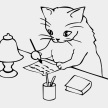The Fifteenth of June
Reliving the worst day of your life gets old after a while.

The first time he lived the day of June 15th, Peter was kicked out of his house when his dad was drunk. The old man had taken Peter’s guitar case, a half-filled backpack, and the boots by the door and tossed them out into the mud on the decrepit brown grass. Peter had been ready to throw out a punch, but he was too worried about his guitar case and the aging beauty inside. He could still remember tuning it for the first time while his mother—no cancer then—had looked on with affection in her eyes.
But Mom had been gone thirty-two days. His dad had been so drunk every day that he hadn’t even gone to the funeral home to pick up her ashes—not that it might have mattered anyway. Dad hadn’t had a paycheck in weeks. And they hadn’t been able to afford the life insurance premium with all the mounting hospital bills before Mom died.
Died. Dead. Departed. There were no better words, none that lessened the blow or alleviated the sting.
“Get the hell out of here!” his dad yelled, and Peter was sure there were neighbors on the block who were looking out their curtains to watch the Evans family meltdown. “You don’t belong here anymore!”
Mom had been the glue holding the two discordant men together; without her, they came apart as easily as a ceramic dish thrown against the floor.
Peter’s eyes blazed as he faced his father. “I wish you were dead instead!”
And those words—the look on his father’s face—the splash of rainwater against his cheeks, mingling with the tears ready to spill over—
He closed his eyes, but there was no longer wetness building behind his eyelids. Peter’s eyes opened to gray early morning light spilling into his bedroom. The old clock on his beat-up nightstand read 6 AM.
“What?” He ran his hands across his face and pinched his cheeks. But nothing happened. The time moved ahead one minute during which Peter held his breath.
Did I get knocked out? He scratched the back of his head and got up from his bed, not bothering to fix the covers before he peeked out his bedroom door. Looking both ways down the hall, he crept out quietly—even if his dad was still passed out, he was a light sleeper—only to frown when he got to the kitchen. The dishes he had remembered washing yesterday were still piled in the sink, and one look in the refrigerator had him staring at the expired gallon of milk he had dumped down the drain—again, yesterday.
“What the hell?” he murmured, the tiny hairs on his neck prickling as he sensed the wrongness of the situation.
Peter thought back to yesterday—where today increasingly felt like a rerun—and tried to think how the day had progressed. Sure, the memory of his yesterday had turned off after he and his dad had argued, but before all that…
There were taps at the kitchen side door, three in quick succession. Peter looked up to see the face of his friend Derek showing through the rectangular window. Not wasting any time, Peter pulled open the door and blurted out, “What day is today?”
Derek’s forehead scrunched up. “Saturday,” he said.
“No, the date.”
“The fifteenth?”
Peter ran a hand down his face. A train of expletives ran through his mind. “D, I think I’m losing my goddamn mind.”
Derek looked more and more confused as the conversation continued. “Is this about your mom?”
I sure as hell hope not. But couldn’t a mental breakdown coincide with a loss of the magnitude he had experienced? And with a dad like his, who would blame him for needing help in the therapy department?
But Peter had read enough comic books and seen all the cliché movies to know that lapses in time like this were best handled methodically—not haphazardly. He would have to see how the day progressed differently than yesterday, the real June 15th, before he made any sudden decisions. What else could he do?
So he did the usual things he had done in the Saturdays since his mother had died: he went to band practice with the guys, worked the afternoon shift as a cashier at the local Kroger, and then he’d quietly let himself into the house so he wouldn’t disturb his dad who, by that time of the day, was settled in his recliner with a six-pack of beer and a bottle of hard liquor beside it as he watched the television.
But just like the prior June 15th, his dad was in a foul mood. And because of the rain Peter’s sneakers squeaked against the linoleum in the kitchen as he came in. Mentally cursing himself, he tried to remain as quiet as possible—but, sure enough, his dad came staggering into the kitchen.
“There’s my loser of a son,” he said. “Can’t even walk into the house without making a fool of himself.”
Anger churned in Peter’s chest as he let his backpack fall to the floor. “Nice one, Dad.”
“Don’t talk back to me!”
“I’m nineteen years old!”
“Oh, big man. Think you can make it on your own? When you can’t even afford a car to drive yourself to work?”
Peter chewed the inside of his cheek and mumbled something.
“What was that?”
“At least I still have a job,” he said, knowing he was stirring the pot but finding himself unable to hold his tongue. “I haven’t let everything fall through just because Mom died.”
A sloppy punch met Peter’s cheek. He had been ready for it, though—going by the script from last night—and was able to lean out of the punch’s initial trajectory that would have landed him straight on the floor.
Then he did the one thing that was markedly different from the last June 15th: he punched his dad back. The old man fell backward on the linoleum, and Peter couldn’t hold back as the weeks of sorrow and frustration overcame him. But each successive punch left him feeling more and more hollow.
Then, when the violence had departed and his fists were torn up at the knuckles, he whispered, “I wish you were dead instead.”
He closed his eyes, taking a shuddering breath, but the next time he opened them he found himself back in bed. Staring at the clock, he saw the mocking time of 6 AM.
The cycle persisted. The dishes and the expired milk continued to reappear. Derek came to retrieve him for band practice, anything to get him out of the house and away from his dad. And each night he found himself fighting more and more with his dad, the tension in the house growing volatile, all the days prior reaching a crescendo of repressed pain running rampant.
Until—the twelfth June 15th, by his count—Peter faced the sad figure of his drunk father, and he felt so, so tired.
Instead of saying the cursed words, the ones he had repeated in spite and sadness and all manner of emotion so many times already, Peter finally said, “I miss Mom too. I miss her so bad. But, Dad, we have to learn how to live without her.”
His father blinked, as if coming out of a daze, before Peter stepped forward. He embraced his father for the first time since the day they had left behind Mom’s body in the hospital bed. He clung, even as the man fought him, until they were both sobbing in each other’s arms. Things still weren’t right—they might never be again—but at least there could be a chance for healing, for catharsis, for a beginning rather than an ending.
All it took was one day for a change to start moving forward.
About the Creator
Jillian Spiridon
just another writer with too many cats
twitter: @jillianspiridon






Comments
There are no comments for this story
Be the first to respond and start the conversation.